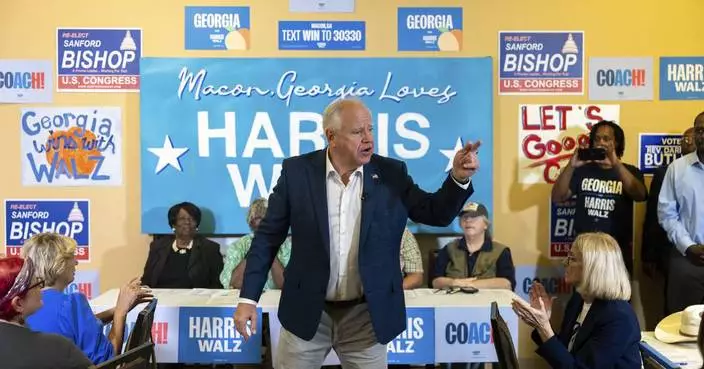AUBURN, Ala. (AP) — Kip Lewis returned an interception 61 yards for the game-winning touchdown, and No. 21 Oklahoma rallied from an 11-point fourth-quarter deficit to defeat Auburn, 27-21 on Saturday for its first-ever Southeastern Conference win.
“That was my first experience with Sooner magic as a head coach,” Oklahoma coach Brent Venables said. “That was an amazing last four drives on offense and defense. ... We played our best ball when it mattered most.”
It was Oklahoma’s first SEC road game after leaving the Big 12. The Sooners bounced back from a loss at home to Tennessee the previous week in their SEC opener.
True freshman quarterback Michael Hawkins Jr. gained 230 yards of total offense in his first career start for Oklahoma after replacing Jackson Arnold during the Tennessee game.
The Sooners (4-1, 1-1 SEC) struggled on offense for much of this game, but they took advantage of several missed opportunities by the Tigers (2-3, 0-2). Oklahoma stopped Auburn on fourth down at the 1-yard line in the first quarter, and the Tigers missed two chances at a short field goal late in the second quarter.
Auburn’s Payton Thorne passed for 338 yards and three touchdowns, but his sixth interception of the season turned out to be the decisive play.
“I’ve got to make sure that (Thorne) understands the situation better, and we should’ve had runs there,” Auburn coach Hugh Freeze said. “I have to be clearer with him on what we have to do there.”
Oklahoma’s Jovantae Barnes cut into Auburn’s 21-10 lead with 8:32 remaining with a 2-yard touchdown run that was set up by a 60-yard pass from Hawkins to J.J. Hester. The 2-point conversion failed, leaving the Tigers ahead by five points.
Lewis then intercepted Thorne, who was making his return to the starting lineup after a two-game absence, and ran it all the way back with 4:06 left to play.
After a late Oklahoma field goal extended the visitors’ lead to six points, Thorne’s last-second pass came up short of the end zone.
Auburn finished the game with nearly 200 more yards of offense than Oklahoma.
“We didn’t play very well,” Venables said. “But we played amazingly when we needed to.”
Oklahoma: The Sooners’ slow offensive start, marked by a large number of injuries at wide receiver and inconsistent line play, continued Saturday. But Hawkins could provide a real spark going forward with his dual-threat ability alongside what has been a strong defense under Venables so far this season.
Auburn: Penalties, questionable clock management and empty scoring drives continue to haunt the Tigers, who have lost all three of their home games against power-conference opponents this season. Now Auburn will start the toughest stretch of its schedule with a losing record.
After a 22-yard run from Jarquez Hunter with a little more than 11 minutes remaining and a two-score lead, Thorne threw back-to-back incompletions before a run for no gain. That led to a missed 51-yard field goal.
The possession only took 1:31 off the clock, and it opened the door for Oklahoma’s rally.
Oklahoma will have a good chance to climb back into the Top 20 with this road comeback win.
Oklahoma: Has an off week before facing No. 1 Texas in Dallas on Oct. 12.
Auburn: Visits No. 2 Georgia next Saturday.
Get poll alerts and updates on the AP Top 25 throughout the season. Sign up here. AP college football: https://apnews.com/hub/ap-top-25-college-football-poll and https://apnews.com/hub/college-football

Auburn wide receiver Malcolm Simmons catches a pass for a touchdown during the first half of an NCAA college football game against Oklahoma, Saturday, Sept. 28, 2024, in Auburn, Ala. (AP Photo/Butch Dill)
NEW YORK (AP) — Our children are told when they're little: Play nicely. Work together. Don't hit. Use your words. Multiply that by nearly 200 countries, leaders of varied backgrounds and a preposterously complex set of 21st-century priorities and goals, and you come up with what exists in the world today: the United Nations.
There, the word for “play nicely” and “work together” is a complex one — “multilateralism” — and its goals often get lost in its syllables. But the principle remains the same: Unite to get more done, unite to offset bullies, unite to find outcomes that all can endorse and that benefit as many of the planet's human beings as possible — and can be the foundation for eventual lasting world peace.
At the U.N. General Assembly this week, it's a principle that leaders — and, not surprisingly, leaders of smaller nations most of all — mention constantly. That's not just because the U.N. has stood for multilateralism since it rose from the dictator-inflicted rubble of World War II. It is because today, in an interconnected era where human fates lie more than ever in what other humans do in other places, cooperation isn't just an ideal but a necessary reality, whether anyone wants it or not.
But the problem, many leaders say, is that despite the hope that the U.N. still offers, the aging model of multilateralism — “a mirror that obstinately reflects the values of 1945,” according to Mexican Foreign Minister Alicia Bárcena — hasn't been retooled to be effective in an era it quite possibly never envisioned.
“We cannot ignore that our common multilateral progress is failing us in the hour of greatest need,” said Hilda Heine, president of the Marshall Islands.
“This old political shell of the post-1945 political order can barely contain the contradictions," said Ralph Gonsalves, the prime minister of Saint Vincent and the Grenadines. “We cannot continue to rule in the old way, but the new is yet to be born.”
Both of those nations are small ones, and that's no coincidence. Though many larger nations embraced multilateralism and still do — to a point, depending on their own strategic priorities — it is smaller states that embrace it most fervently. After all, they stand to benefit most from a united front in everything from military operations to development. “For small states, multilateralism in international law is not an option. It is in fact an existential necessity,” Singapore’s foreign minister, Vivian Balakrishnan, said Saturday.
Four generations after World War II ended, the challenges of the 21st century and — of late — the rising tide of populism have led many to conclude that old models of multilateralism aren’t working. But even leaders who still believe that working together and equally is ultimately the most effective and most secure way to do things lamented, one after another, that they are still waiting for the emergence of a fresh approach.
António Guterres, head of the United Nations for the past seven years, has spent most of that time preaching passionately about the virtues of multilateralism — first patiently, then less so, then more urgently, now increasingly desperately. He knows things aren't working. He believes they still can — not in spite of an increasingly complex world but precisely because of its realities.
“I have no illusions about the obstacles to reform of the multilateral system,” Guterres told leaders this week. “Those with political and economic power – and those who believe they have power – are always reluctant to change. But the status quo is already draining their power. Without reform, fragmentation is inevitable, and global institutions will become less legitimate, less credible and less effective.”
Fragmentation. That's a key word here. The rise of the internet and the global economy and the subsequent repercussions stitched things together in some ways but tore them into a million pieces in others. Long-prevailing narratives are crumbling — for good and for ill. Putting the pieces back into a recognizable and productive mosaic — the core job of the United Nations — is a Sisyphean task.
This is where most conversations about multilateralism tend to end up. The very things that make it strong — many voices, many backgrounds, diverse priorities — also make it, and the United Nations itself, almost impossible to wrangle.
That has a particularly strong impact on those smaller states, which need that collaboration desperately in the face of larger, more muscular ones.
Increasingly beleaguered Tuvalu can't solve the encroaching waters of climate change on its own. Saint Kitts and Nevis isn't going to figure out all the impact of AI alone. Without a thriving international economy, there are a lot more problems that descend upon everywhere from Kazakhstan to Suriname to Eswatini. African nations in particular have been seeking a permanent seat on the powerful U.N. Security Council so they can have a strong bloc of cooperation — and power — within the larger one.
“Multilateral institutions, including the Security Council, do not represent African needs and aspirations,” said Nangolo Mbumba, Namibia's president.
Because of the wide perception that multilateralism is at a breaking point, Guterres this year convened a summit that produced a “Pact for the Future,” a wide-ranging plan that the secretary-general said was “designed to bring multilateralism back from the brink.”
He insisted that, unlike many other U.N. initiatives, this one must be more than talk and documents but must produce tangible, collaborative results in coming years. Essentially, it resembles a soft reboot of the United Nations itself to make it more relevant in an age of globalization, interconnectivity, fragmentation and artificial intelligence.
Many speakers this week have seized upon precisely that kind of modernization across the board — what Mohamed Irfaan Ali, the president of Guyana, called “enlightened multilateralism.” To nations like his, that notion would represent a more substantive inclusion, a world in which they are not simply partners but equal partners — not just being a member of the club of nations, but helping to run the clubhouse.
Could the “great powers” ever accept this? Could a reset, even a limited one, of the only truly global body of nations push the U.N. back on the path it has long envisioned? Everyone, including Guterres, insists that it's possible — but that time for a new and reinvigorated multilateralism is running out.
"The world stands fractious, polarized and frustrated. Conversations have become difficult; agreements even more so," said Indian Foreign Minister Subrahmanyam Jaishankar. “This is surely not what the founders of the U.N. would have wanted of us.”
The founders recognized that humans wouldn't always play nicely — but that they had to work together. And, ideally, not hit each other. And using their words? Even in a forum committed to dialogue and understanding (not to mention long equipped with real-time translation), that is becoming a taller order with each passing year. “If we carry on like this," Jaishankar said Saturday, "the state of the world is only going to get worse.”
Ted Anthony, director of new storytelling and newsroom innovation for The Associated Press, has been writing about international affairs since 1995. Follow him at http://x.com/anthonyted
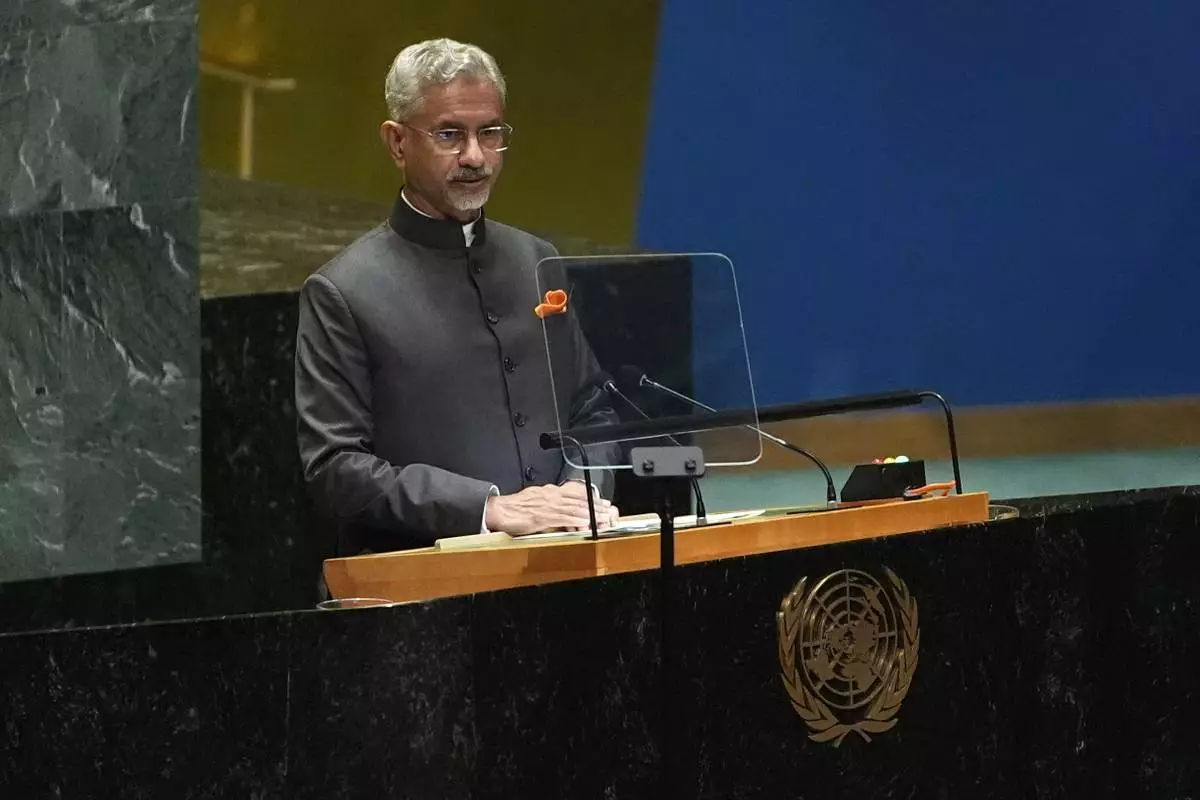
India's Minister for External Affairs Subrahmanyam Jaishankar addresses the 79th session of the United Nations General Assembly, Saturday, Sept. 28, 2024. (AP Photo/Pamela Smith)
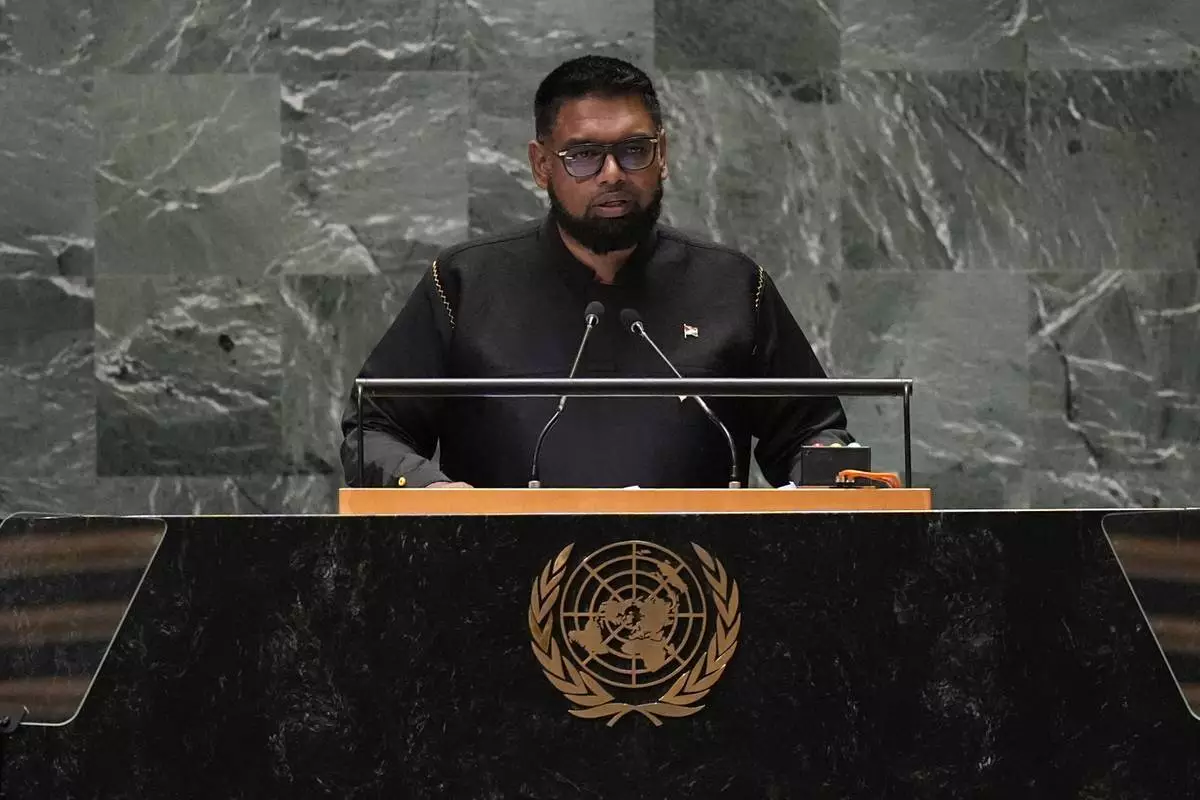
President of Guyana Mohamed Irfaan Ali addresses the 79th session of the United Nations General Assembly, Wednesday, Sept. 25, 2024. (AP Photo/Pamela Smith)
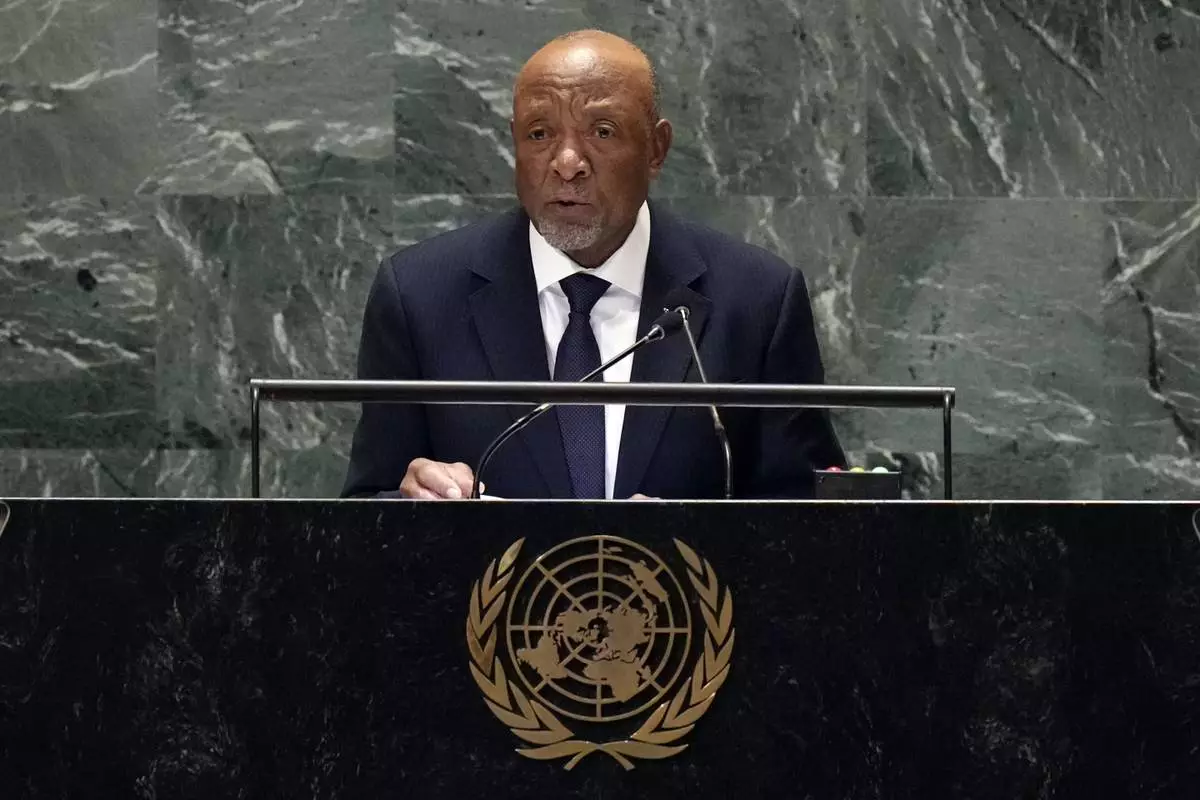
Namibia President Nangolo Mbumba addresses the 79th session of the United Nations General Assembly, Wednesday, Sept. 25, 2024. (AP Photo/Richard Drew)
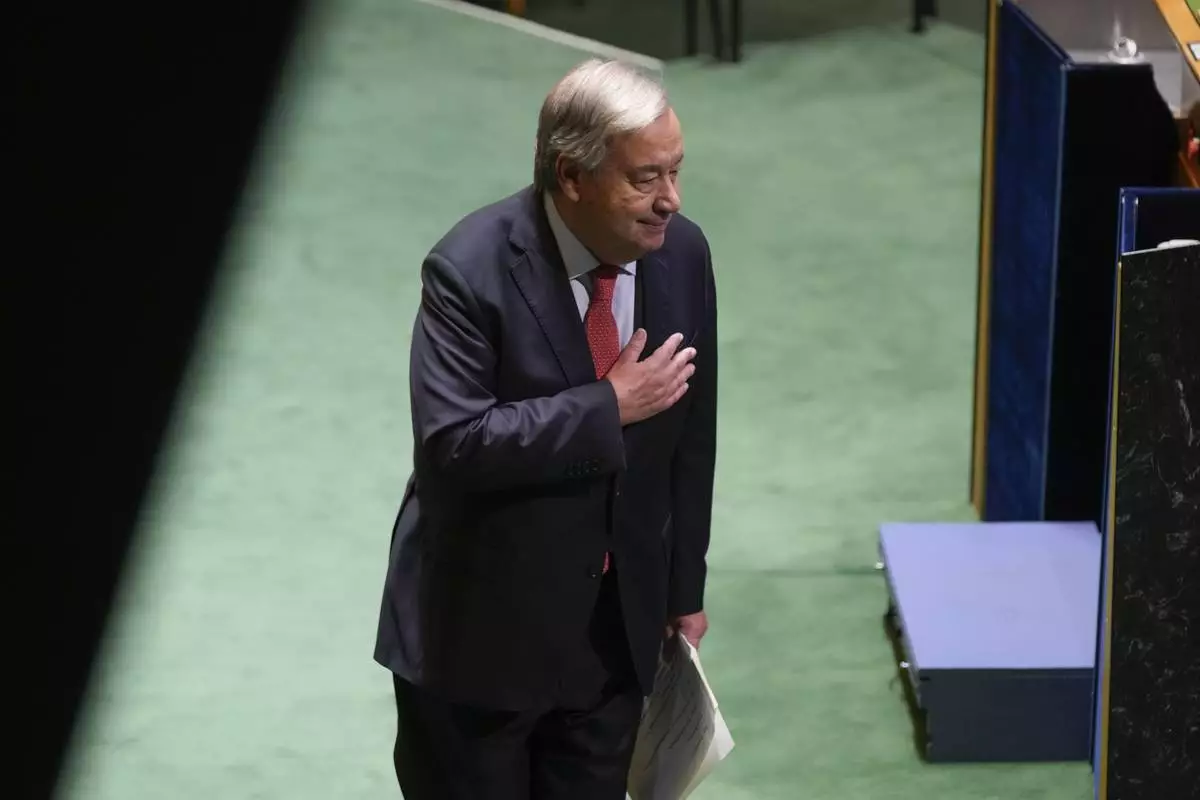
United Nations Secretary-General António Guterres puts his hand over his heart after speaking to the 79th session of the United Nations General Assembly at United Nations headquarters, Tuesday, Sept. 24, 2024. (AP Photo/Seth Wenig)
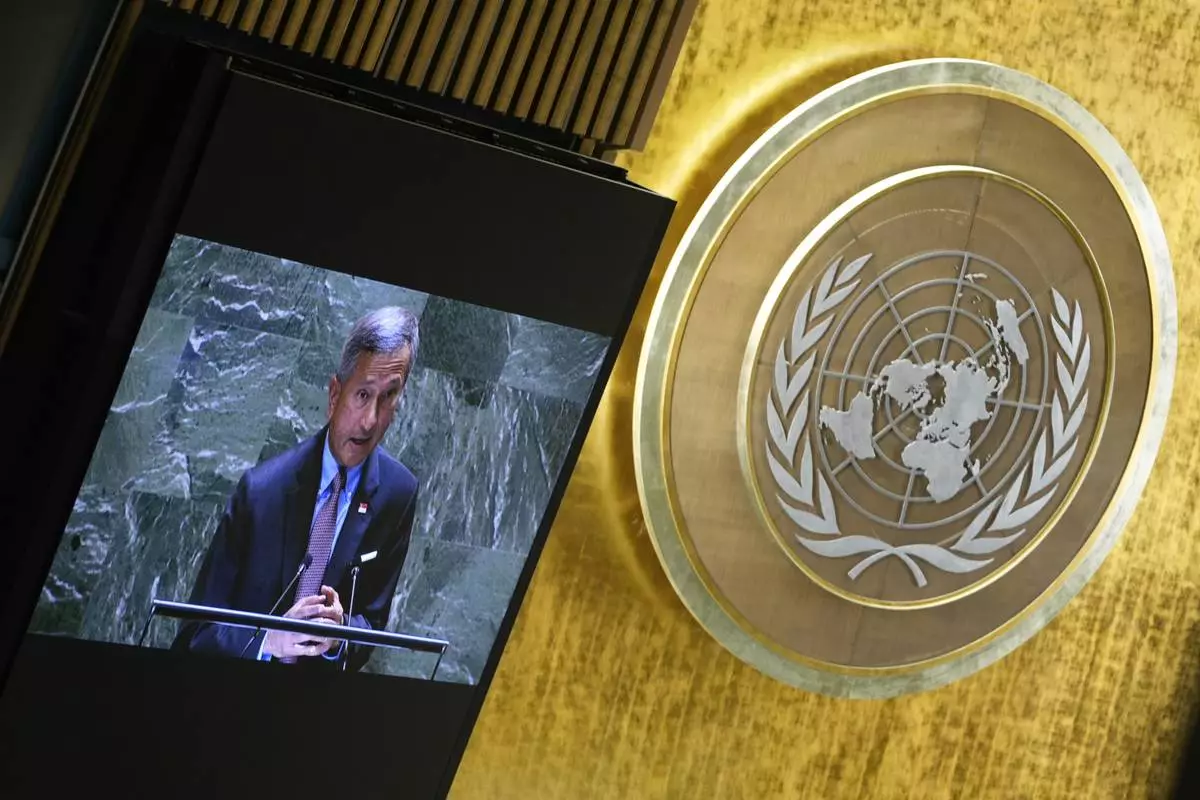
Singapore's Minister for Foreign Affairs Vivian Balakrishnan addresses the 79th session of the United Nations General Assembly, Saturday, Sept. 28, 2024. (AP Photo/Pamela Smith)

Saint Vincent and the Grenadines Prime Minister Ralph Gonsalves addresses the 79th session of the United Nations General Assembly, Friday, Sept. 27, 2024. (AP Photo/Richard Drew)
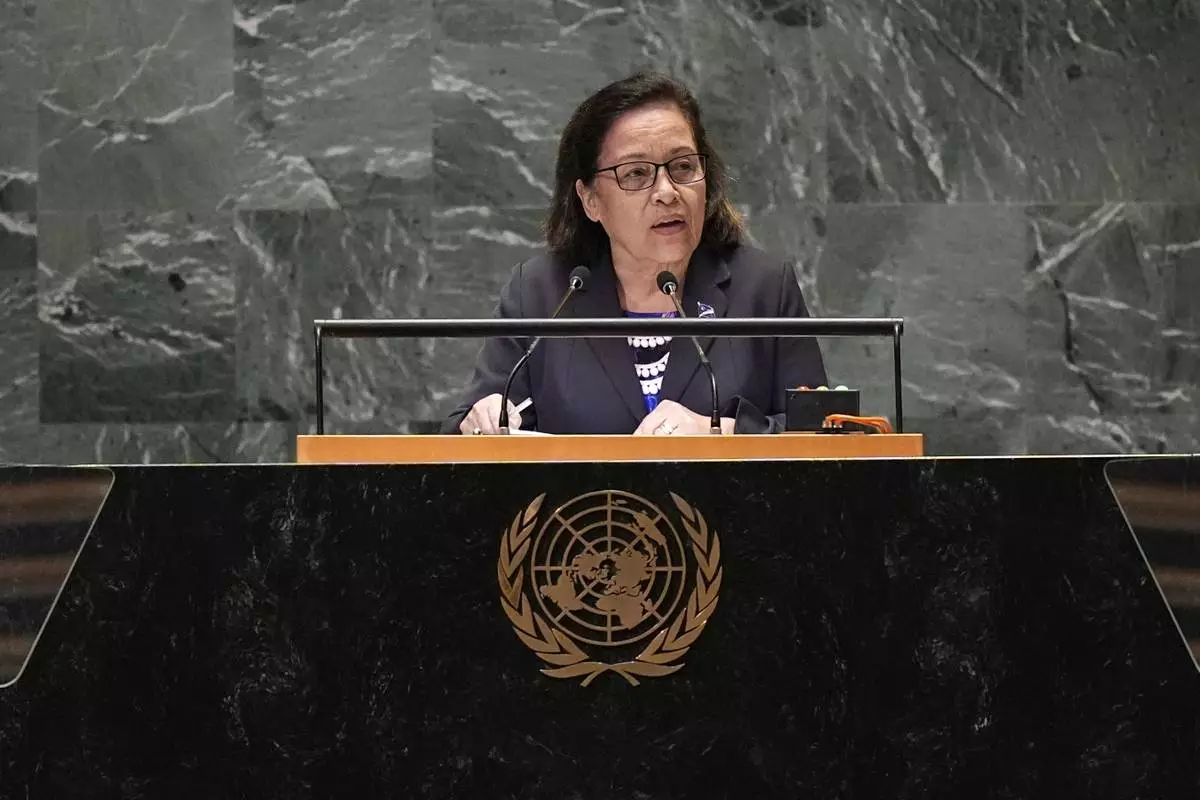
President of the Marshall Islands Hilda Heine addresses the 79th session of the United Nations General Assembly, Wednesday, Sept. 25, 2024. (AP Photo/Pamela Smith)
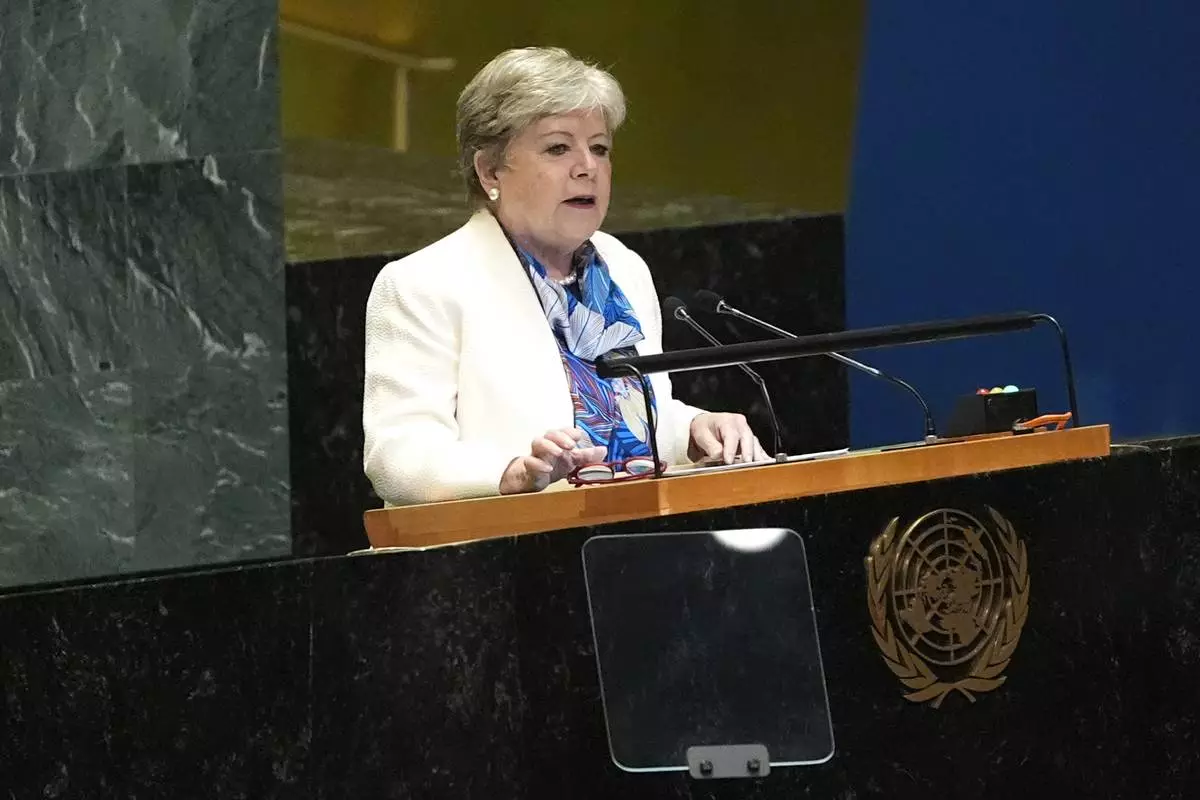
Mexico's Minister for Foreign Affairs Alicia Bárcena addresses the 79th session of the United Nations General Assembly, Saturday, Sept. 28, 2024. (AP Photo/Pamela Smith)
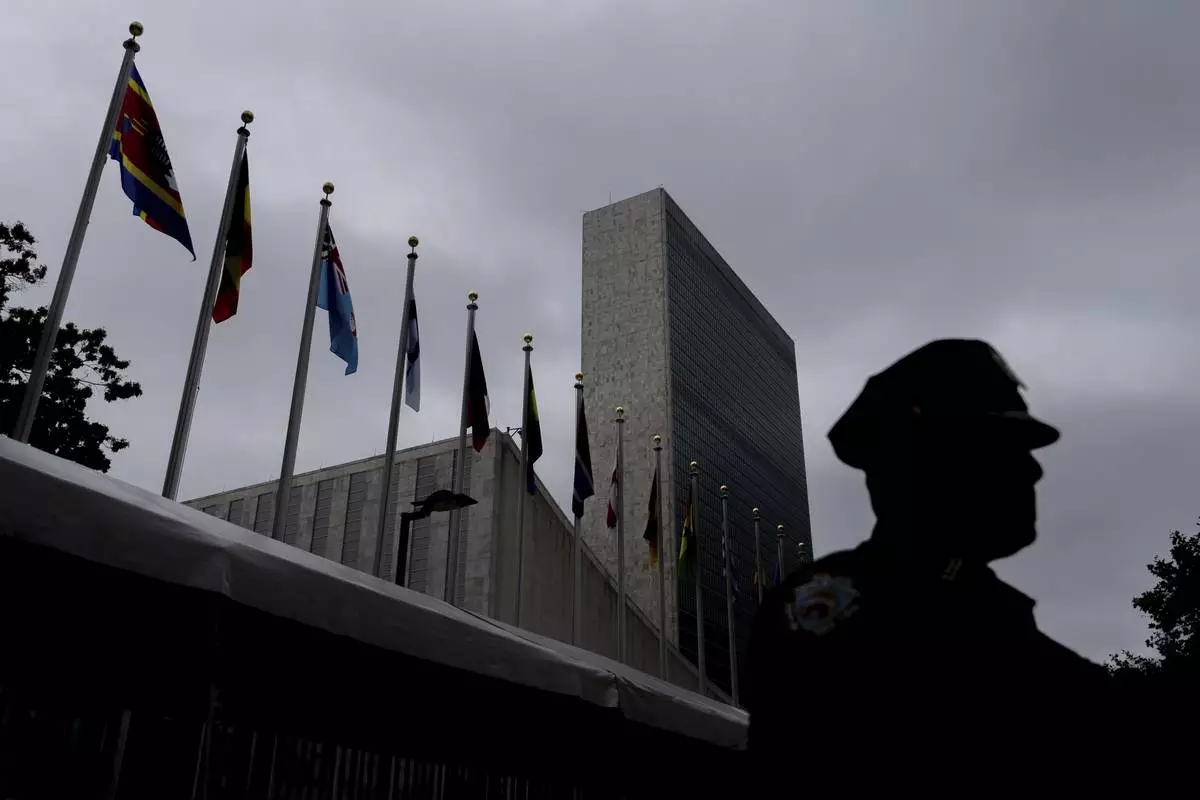
The United Nations headquarters during the 79th session of the U.N. General Assembly, Wednesday, Sept. 25, 2024. (AP Photo/Julia Demaree Nikhinson)



















